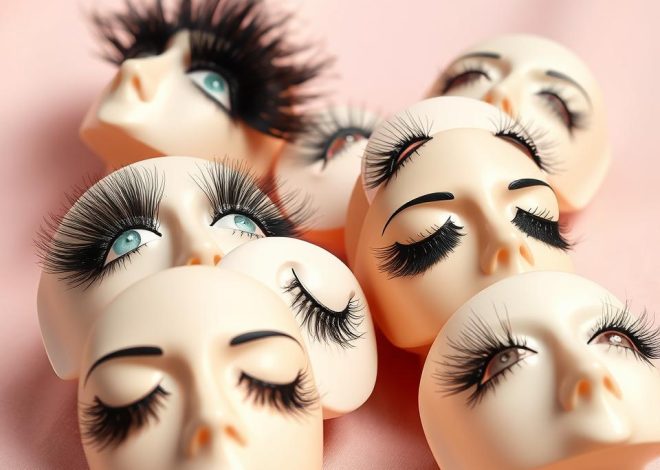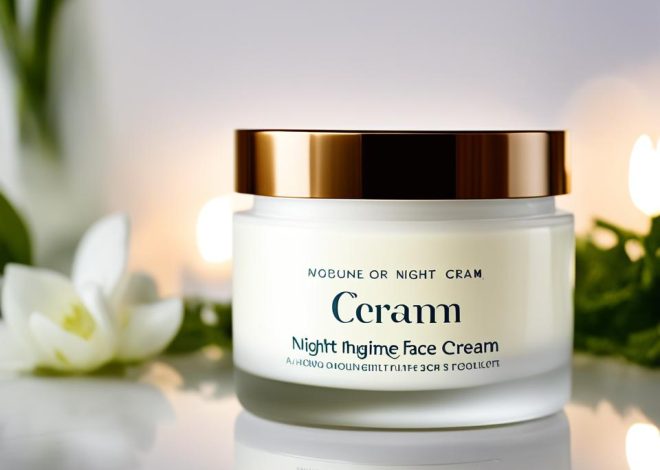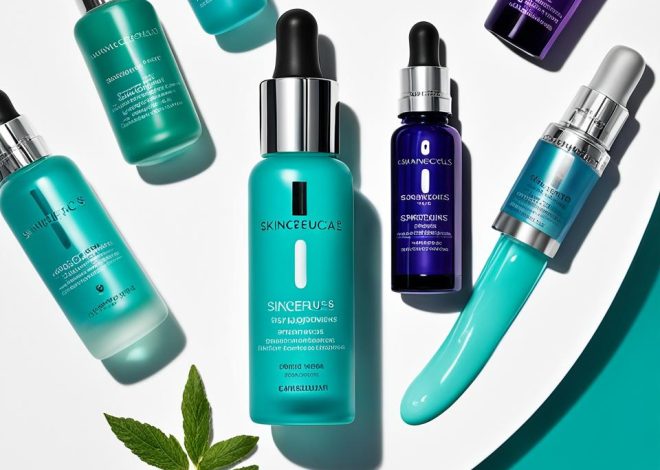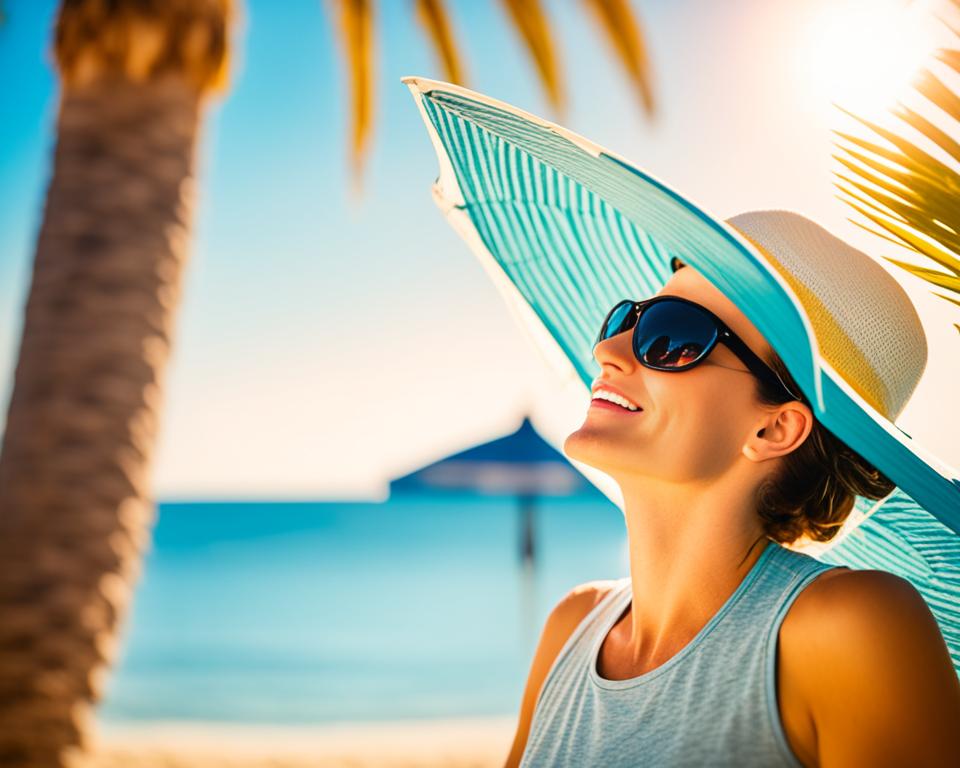
Safeguard Your Lid from Sun Damage Effectively
Protecting your lids from sunlight is crucial to prevent UV damage and maintain optimal lid health. The delicate skin around your eyes is particularly vulnerable to the harmful effects of UV rays. Without proper lid protection from UV rays, you may experience skin discoloration, wrinkles, and even an increased risk of eye diseases.
In this article, we will explore the importance of protecting your lids from sunlight and provide effective strategies for preventing UV damage. Whether you’re enjoying outdoor activities, strolling in the park, or simply going about your daily routine, it’s essential to prioritize lid protection.
By following expert tips and utilizing reliable sun shielding methods, you can shield your lids from harmful sunlight and ensure their long-term health.
Read more interesting information at ::i-pasta
Understanding Sunlight’s Impact on Your Lids
Before diving into the various methods of preventing sun damage on lids and implementing effective lid sun protection, it’s crucial to understand how sunlight can negatively affect them. UV rays, a component of sunlight, can cause significant damage to the delicate skin on your lids. Proactive measures are necessary to shield your lids from the harmful effects of UV exposure.
UV rays can penetrate the skin and lead to various issues, including premature aging, fine lines, wrinkles, and even skin cancer. Your lids, being one of the most sensitive areas of your face, are particularly vulnerable to sun damage. The thin skin on your lids lacks the same protective barrier as the rest of your face, making it more susceptible to the harmful effects of UV radiation.
The skin on your lids is also prone to developing conditions such as eyelid melanoma, squamous cell carcinoma, and basal cell carcinoma. These conditions can be attributed to prolonged exposure to UV radiation without adequate lid sun protection.
Additionally, the sun’s rays can cause photoaging, which leads to the breakdown of collagen and elastin fibers in the skin. This can result in sagging, drooping eyelids, and the formation of wrinkles. By understanding the potential damage caused by UV rays, you can appreciate the importance of implementing preventive measures to keep your lids safe from sun damage.
Maintaining Lid Health with Proper Sun Protection
“The thin and delicate skin on your lids requires adequate sun protection to prevent long-term damage. By taking proactive measures to shield your lids from the sun’s harmful rays, you can maintain optimal lid health and reduce the risk of developing skin conditions.”
With a solid understanding of the impact of sunlight on your lids, you can now explore the various strategies and products available for preventing sun damage on lids and ensuring effective lid sun protection. In the following sections, we will delve into the benefits of using lid covers, discuss the importance of selecting the right products with UV protection, and provide tips for incorporating sun shielding practices into your daily routine. These proactive measures will help you safeguard your lids and maintain healthy, beautiful skin for years to come.
The Benefits of Lid Cover against Sunlight
When it comes to protecting your lids from the harmful effects of sunlight, using a cover or shield can provide several significant advantages. These protective measures not only shield your lids from direct exposure but also minimize the risk of UV damage. Let’s explore the benefits of lid cover against sunlight and how it can help you maintain healthy lids.
1. Minimizes UV Exposure
The primary benefit of using a lid cover or shield is its ability to minimize UV exposure. Lid coverings act as a physical barrier, blocking harmful UV rays from reaching the delicate skin of your lids. By shielding your lids, you can significantly reduce the risk of sun damage, such as sunburn or premature aging.
2. Prevents Sun Glare
In addition to minimizing UV exposure, a lid cover can also help prevent sun glare. Sunlight reflecting off surfaces can create intense glare, which can be irritating and uncomfortable for your eyes. By using a lid cover, you can effectively shield your eyes from excessive brightness and enjoy clear vision even in bright outdoor conditions.
“Lid covers provide a practical and convenient solution for protecting your lids from sunlight. With their ability to minimize UV exposure and prevent sun glare, they are an essential accessory for maintaining optimal lid health.”
3. Offers Versatility and Convenience
Lid covers come in various styles and designs, offering versatility and convenience. You can choose from a wide range of options, including sunglasses with built-in lid covers, removable lid shields, or wraparound sun visors. This allows you to select the lid cover that best suits your preferences and lifestyle, ensuring maximum comfort and protection.
4. Promotes Skin Health
By using a lid cover against sunlight, you are taking proactive measures to protect the delicate skin of your lids. Sun damage can lead to various skin issues, including dryness, redness, and increased vulnerability to infections. By minimizing UV exposure and preventing sun damage, a lid cover helps promote overall lid health and keeps your skin looking and feeling its best.
5. Convenient for Outdoor Activities
Whether you’re hiking, playing sports, or simply enjoying a day at the beach, a lid cover offers convenient protection for your lids during outdoor activities. It allows you to enjoy your favorite pastimes while safeguarding your eyes from the sun’s harmful rays. With a lid cover, you can maintain an active lifestyle without compromising your lid health.
Overall, using a lid cover or shield against sunlight provides a multitude of benefits. It minimizes UV exposure, prevents sun glare, offers versatility and convenience, promotes overall skin health, and facilitates enjoyable outdoor activities. Incorporating a lid cover into your sun protection routine is an effective way to safeguard your lids and maintain optimal lid health.
UV Protection for Lids: Choosing the Right Products
When it comes to protecting your lids from harmful UV rays, not all products are created equal. To keep your lids safe from sun glare, it’s crucial to choose the right UV protection products. Here’s a guide to help you select the most effective options:
Sunglasses
Investing in a quality pair of sunglasses is essential for shielding your lids from the sun’s harmful rays. Look for sunglasses that offer 100% UV protection, as they will effectively keep your lids safe from sun glare. Opt for sunglasses with large lenses or wraparound styles to provide maximum coverage and minimize exposure.
Sunscreens
Sunscreens designed specifically for the delicate skin around the lids can provide an extra layer of protection. Look for broad-spectrum sunscreens with an SPF of 30 or higher. Apply the sunscreen to your lids before heading out, ensuring complete coverage.
Eye Creams with SPF
Some moisturizing eye creams also offer UV protection. Opting for an eye cream with SPF not only hydrates the skin around your lids but also provides an additional shield against sun damage. Look for eye creams formulated with antioxidants and a minimum SPF of 15 to 30 for optimal results.
All-in-One Protective Eyewear
If you prefer a single product that combines UV protection and comfort, consider all-in-one protective eyewear. These innovative solutions typically offer wraparound coverage, built-in UV filters, and lightweight materials for a comfortable fit. Look for options specifically designed to protect the lids from sun glare.
By selecting the right UV protection products, such as sunglasses, sunscreens, eye creams with SPF, and all-in-one protective eyewear, you can effectively shield your lids from harmful UV rays. Remember to prioritize products that offer sufficient UV protection to keep your lids safe from sun glare.
Eyewear Options for Lid Sun Protection
When it comes to protecting your lids from the damaging effects of sunlight, sunglasses are a must-have accessory. Not only do they shield your eyes from harmful UV rays, but they also provide an extra layer of defense for your delicate lids. In this section, we will explore different types of sunglasses and their level of UV protection, along with tips for ensuring a proper fit for optimal lid coverage.
Types of Sunglasses for Lid Sun Protection
When choosing sunglasses for lid sun protection, look for options specifically designed to block out UV rays. Here are some common types:
- Polarized sunglasses: These sunglasses feature a special filter that blocks glare from reflective surfaces, providing excellent protection for your lids.
- Wrap-around sunglasses: These sunglasses have a curved shape that extends the coverage around your eyes, minimizing UV exposure to your lids.
- Photochromic sunglasses: These sunglasses darken automatically in response to sunlight, adjusting to different light conditions and offering constant UV protection.
- Blue-light-filtering sunglasses: These sunglasses not only protect your lids from UV rays but also filter out harmful blue light emitted by digital devices, reducing eye strain.
Level of UV Protection
When purchasing sunglasses, it’s crucial to check the level of UV protection they offer. Look for sunglasses labeled with 100% UV protection or UV400, which means they block both UVA and UVB rays, the two main types of UV radiation that can harm your lids.
Ensuring a Proper Fit
To ensure optimal lid coverage and maximum sun protection, it’s important to choose sunglasses that fit properly. Here are some tips for achieving the perfect fit:
- Make sure the sunglasses sit comfortably on the bridge of your nose without pinching or sliding down.
- Check that the sunglasses cover your lids completely, extending beyond the edges of your eyes.
- Ensure the sunglasses fit snugly without causing any discomfort or pressure on your temples.
- Consider adjustable nose pads or temple tips for a customizable fit.
Remember, properly fitting sunglasses not only provide optimal protection for your lids but also enhance your overall comfort and visual experience.
By choosing the right eyewear options and ensuring a proper fit, you can effectively protect your lids from sun damage and enjoy the outdoors with confidence.
SPF: Sunscreen Protection for Your Lids
When it comes to preventing sun damage on lids and keeping your eyes safe from sun glare, sunscreen plays a crucial role. Applying sunscreen specifically designed for delicate areas like your lids can provide effective protection against harmful UV rays.
The skin on your lids is thin and sensitive, making it susceptible to sunburn and long-term damage. By applying sunscreen, you create a barrier that blocks the sun’s harmful rays, reducing the risk of sunburn, premature aging, and even certain eye conditions.
To ensure you choose a sunscreen that is safe and effective for your lids, follow these tips:
- Select a sunscreen with a high SPF: Look for a sunscreen with a sun protection factor (SPF) of at least 30. This provides a higher level of protection against both UVA and UVB rays.
- Opt for a broad-spectrum sunscreen: Broad-spectrum sunscreens provide protection against both UVA and UVB rays. This helps shield your lids from the full spectrum of harmful sunlight.
- Choose a sunscreen specifically formulated for the face: Facial sunscreens are designed to be lightweight, non-greasy, and gentle on the skin. Look for a sunscreen that is labeled as safe for use around the eyes.
- Consider physical or mineral sunscreens: Physical or mineral sunscreens contain ingredients like zinc oxide or titanium dioxide, which form a protective barrier on the skin. These sunscreens are less likely to cause irritation and are an excellent choice for sensitive lids.
- Reapply sunscreen regularly: Remember to reapply sunscreen every two hours, or more frequently if you’re swimming or sweating. This ensures continuous protection throughout the day.
By incorporating sunscreen into your daily skincare routine, you can effectively prevent sun damage on lids and keep your eyes safe from sun glare. Remember, a little extra effort now can go a long way in maintaining healthy and youthful-looking lids in the future.
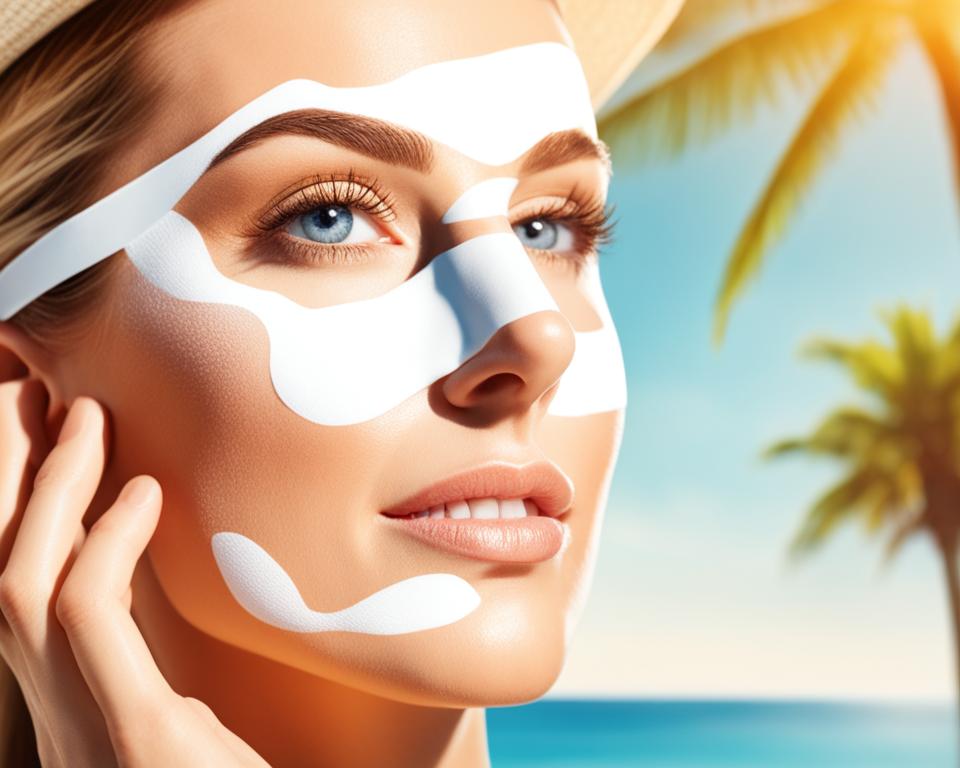
“Sunscreen is a crucial tool in protecting your lids from harmful UV rays. Choose a sunscreen specifically formulated for the face, and remember to reapply regularly for optimal protection.”
Hats and Headwear for Lid Sun Protection
Protecting your lids from harmful UV exposure is essential for maintaining optimal lid health. Alongside sunglasses and sunscreen, wearing the right hats and headwear can provide an additional layer of sun shielding for lids. By choosing headwear that offers optimal lid coverage, you can effectively shield your lids from the damaging effects of the sun.
There are various types of hats and headwear available that offer excellent lid sun protection. Let’s explore some of the options:
- Wide-brimmed hats: These hats provide a wide and sturdy brim that extends beyond your face, offering maximum shade and protection for your lids. They are especially beneficial for outdoor activities like hiking, gardening, or spending extended periods of time in the sun.
- Bucket hats: Bucket hats have a downward sloping brim that surrounds your entire head, including your lids. They provide all-around protection and are a fashionable choice for casual outings or beach trips.
- Baseball caps with neck flaps: These caps feature an extended flap at the back to protect your neck and a visor at the front to shield your face and lids. They offer a sporty and practical solution for lid sun protection.
- UPF-rated headbands: These headbands are designed with moisture-wicking fabric that offers UPF (Ultraviolet Protection Factor) rating, providing a lightweight and functional option for lid sun protection during physical activities.
When selecting hats or headwear for lid sun protection, consider materials that offer added UV protection, such as UPF-rated fabrics. Opt for hats with adjustable straps or drawstrings to ensure a snug fit that stays secure, even in windy conditions.
By incorporating hats and headwear into your sun protection routine, you can shield your lids from harmful UV exposure and reduce the risk of sun damage. Remember to combine hat usage with other sun protection methods, such as sunglasses and sunscreen, for comprehensive lid care.
Comparison of Sun Protection Ratings
| Hat Type | Sun Protection Rating |
|---|---|
| Wide-brimmed hats | Excellent UV protection |
| Bucket hats | Good UV protection, all-around coverage |
| Baseball caps with neck flaps | Moderate to good UV protection for face and lids |
| UPF-rated headbands | Lightweight sun protection, ideal for active use |
Tips for Proper Lid Sunshielding
When it comes to protecting your lids from harmful sunlight, following the right techniques is essential. In this section, we will provide practical tips and expert advice on how to effectively shield your lids from sun damage and UV rays.
1. Proper Application of Sunscreen
Applying sunscreen to your lids is crucial for preventing sun damage. Use a broad-spectrum sunscreen with a high SPF and apply it generously to your entire lid area. Remember to reapply every two hours, especially if you’re spending an extended period outdoors.
2. Adjusting Sunglasses for Maximum Protection
Wearing sunglasses is a simple yet effective way to shield your lids from UV rays. Make sure your sunglasses have UV protection and wraparound frames for optimal coverage. Adjust the fit to ensure they sit comfortably on your nose bridge and temples, providing maximum lid protection.
3. Seek Shade Whenever Possible
When the sun is at its peak, seek shade to minimize direct sunlight exposure to your lids. Whether it’s under a tree or an umbrella, finding shade can significantly reduce the risk of sun damage. Plan your outdoor activities accordingly to avoid peak sun hours.
4. Wear a Wide-Brimmed Hat
A wide-brimmed hat is an excellent addition to your sun protection arsenal. Opt for a hat with a wide brim that can provide shade not only to your face but also your lids. This extra layer of protection can shield your lids from direct sunlight and UV rays.
5. Use Eye Drops for Moisture
Exposure to the sun can cause dryness and irritation to your lids. Use lubricating eye drops to keep your lids moisturized and reduce any discomfort. Look for drops specifically formulated for dry eyes and apply them as needed throughout the day.
By following these tips, you can effectively prevent sun damage on your lids and ensure they stay protected from harmful UV rays. Implement these techniques as part of your daily sun protection routine to maintain optimal lid health
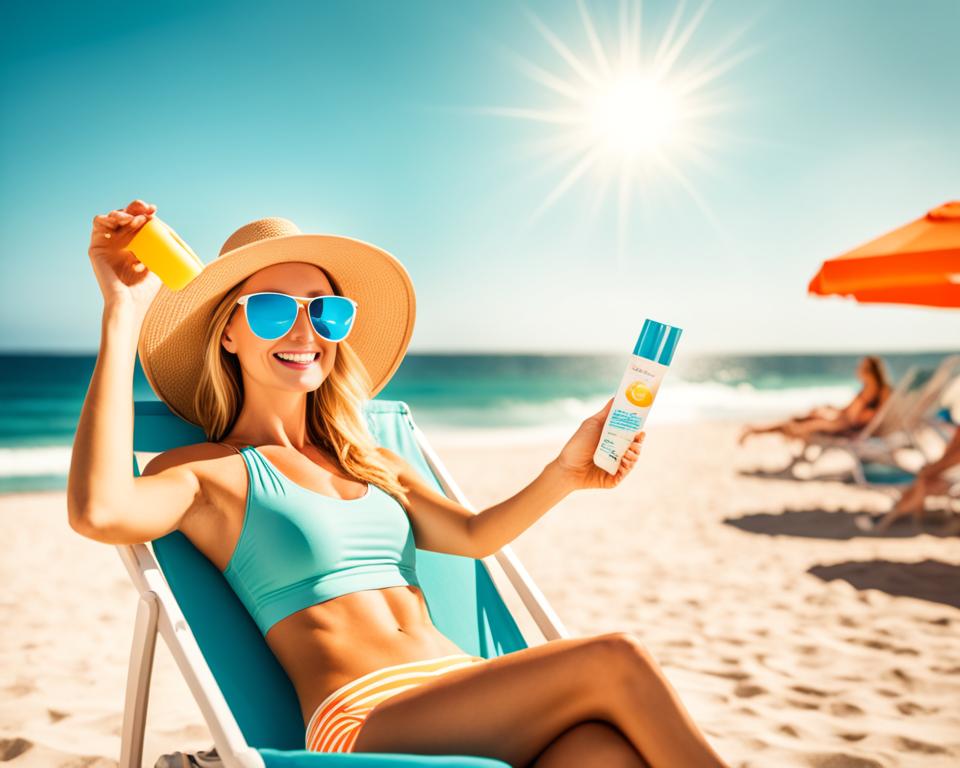
Seeking Shade: The Importance of Sun Avoidance
While protective measures are crucial, avoiding direct sunlight altogether is also essential. Seeking shade can further reduce the risk of lid damage and help protect the lid from sunlight.
UV rays can still reach the lids even when the sun is not at its peak. By staying in the shade, you can minimize your lid’s exposure to harmful UV radiation and prevent sun damage on lids.
During peak sun hours, typically between 10 am and 4 pm, the intensity of UV rays is the strongest. It is highly recommended to seek shade during these hours to provide the best protection for your lids.
When seeking shade, look for options like covered structures, umbrellas, or natural shade provided by trees or buildings. These can create a physical barrier between your lids and the direct sunlight, effectively protecting them from the sun’s harmful rays.
“Preventing sun damage on lids requires a comprehensive approach. Along with using protective products like sunglasses and sunscreen, seeking shade plays a vital role in minimizing UV exposure,” says Dr. Emily Johnson, a renowned dermatologist.
In addition to protecting your lids, seeking shade provides other benefits as well. It helps prevent sunburn on the rest of your face and reduces the risk of other sun-induced skin issues like premature aging and skin cancer.
Remember, even if you are in the shade, UV rays can still reach your lids by reflecting off surfaces like sand, water, or concrete. Therefore, wearing additional protective measures like sunglasses and sunscreen is crucial, even when seeking shade.
Benefits of Seeking Shade for Lid Protection:
- Minimizes UV exposure to lids
- Reduces the risk of sunburn and premature aging
- Protects against the development of skin cancer
- Provides relief from intense heat and direct sunlight
- Ensures overall comprehensive sun protection
Make it a habit to seek shade whenever possible, especially during peak sun hours and when engaging in outdoor activities. By combining protective measures with careful sun avoidance, you can effectively protect your lids from sunlight and prevent sun damage on lids.
| Product | SPF Rating | Suitable for Lids? |
|---|---|---|
| Sunscreen | SPF 30, SPF 50 | Yes |
| Hats | N/A | Yes |
| Sunglasses | N/A | Yes |
The Role of Nutrition in Lid Sun Protection
When it comes to safeguarding your lids from the harmful effects of the sun, it’s essential to consider not only external measures but also internal protection. Proper nutrition plays a crucial role in maintaining healthy skin, including your lids. By incorporating a balanced diet rich in antioxidants and vitamins, you can enhance your lid’s natural defense against sun damage, ensuring they stay safe and healthy.
Nutrients such as vitamins C and E, beta-carotene, lutein, and zeaxanthin are known for their potential to protect the skin from UV damage and improve overall skin health. Including foods that are rich in these nutrients can provide your lids with added protection against the sun’s harmful ultraviolet rays.
“A well-rounded diet comprising fruits, vegetables, whole grains, and lean proteins can significantly contribute to the health and resilience of your lids,” says Dr. Maria Davis, a dermatologist at SunSafe Dermatology.”
Essential Nutrients for Lid Sun Protection
Here are some key nutrients that can help protect your lids from sun damage:
- Antioxidants: Foods such as berries, citrus fruits, leafy greens, and bell peppers are excellent sources of antioxidants. These powerful compounds can help neutralize free radicals caused by UV exposure and reduce the risk of lid damage.
- Vitamin C: Consuming foods rich in vitamin C, like oranges, strawberries, and kiwis, can promote collagen production and strengthen the skin’s natural defense against UV rays.
- Vitamin E: Nuts, seeds, spinach, and broccoli are examples of foods high in vitamin E. This nutrient helps protect the skin’s lipid barrier and reduces the risk of oxidative damage from sun exposure.
- Beta-carotene: Found in brightly colored fruits and vegetables like carrots, sweet potatoes, and spinach, beta-carotene converts to vitamin A in the body, promoting skin health and providing sun protection.
- Lutein and Zeaxanthin: These plant pigments can be found in leafy green vegetables, such as kale, spinach, and collard greens. Lutein and zeaxanthin help filter out harmful blue light and protect against oxidative damage caused by the sun.
Remember, a well-rounded diet, combined with other protective measures, will provide comprehensive lid sun protection. Consult with a healthcare professional or a registered dietitian for personalized recommendations based on your specific needs and dietary preferences.
Hydration for Sun-Damaged Lids
Proper hydration is not only essential for overall skin health but also plays a role in repairing sun-damaged lids. When your lids are exposed to the sun, they can become dry and lose moisture, leaving them susceptible to damage. In this section, we will explore the importance of staying hydrated and provide tips for maintaining proper lid moisture to protect against sun damage.
The Importance of Hydration
Hydration is crucial for maintaining healthy skin, including your lids. When your body is well-hydrated, it helps to promote the production of natural oils, keeping your skin moisturized and preventing dryness. This is particularly important for your lids, as they have thinner and more delicate skin compared to other areas of your body.
In addition to preventing dryness, adequate hydration also assists in the repair process of sun-damaged lids. Sun exposure can cause damage to the skin barrier, leading to inflammation and irritation. By staying hydrated, you can support your skin’s healing process and aid in restoring its natural protective functions.
Tips for Maintaining Proper Lid Moisture
To protect your lids from sun damage, it is important to maintain proper lid moisture. Here are some tips to help you keep your lids hydrated:
- Drink an adequate amount of water throughout the day to stay hydrated. Aim for at least 8 glasses of water daily.
- Avoid excessive caffeine or alcohol consumption, as they can dehydrate your body and contribute to dryness.
- Include hydrating foods in your diet, such as fruits and vegetables with high water content.
- Apply a hydrating eye cream or gel specifically formulated for the delicate skin around your eyes, including your lids.
- Use a humidifier in your living space to add moisture to the air, especially during dry conditions or winter months.
Lid Protection on Cloudy Days
Many people mistakenly believe that cloud cover provides adequate protection against harmful UV rays. However, the truth is that sunlight can still cause damage to your lids even on cloudy days. It’s important to understand the misconceptions surrounding cloud cover and take proactive measures to prevent sun damage.
The Misconceptions Around Cloud Cover and UV Exposure
Clouds may block some of the sunlight, but they cannot completely shield you from UV radiation. UV rays are still present even when it’s cloudy, and they can penetrate through the cloud cover to reach your delicate lids. The intensity of these rays may vary depending on factors such as cloud thickness, altitude, and geographical location.
“Even on overcast days, up to 80% of the sun’s UV rays can reach the Earth’s surface, including your sensitive lids. Don’t let cloud cover give you a false sense of security.”
Recommendations for Ongoing Lid Protection
To prevent sun damage on your lids, it’s crucial to continue protecting them even when the sun isn’t visible. Here are some recommendations for lid cover against sunlight on cloudy days:
- Wear sunglasses with UV protection: Choose sunglasses with a high level of UV protection, even on cloudy days. Look for sunglasses that block 100% of UVA and UVB rays to ensure optimal lid shield from harmful UV radiation.
- Apply sunscreen to your lids: Use a broad-spectrum sunscreen with a high SPF specifically formulated for the delicate skin around your eyes. Apply it generously to your lids and reapply every two hours, especially if you’re spending an extended time outdoors.
- Seek shade when possible: Whenever feasible, stay in shaded areas to minimize direct exposure to the sun’s rays. Trees, umbrellas, and buildings can provide additional protection for your lids.
- Wear a wide-brimmed hat: Opt for a hat with a wide brim that can offer extra protection to your lids, minimizing the amount of sunlight that reaches them.
- Use a lid balm with SPF: Consider using a specialized lid balm or cream containing SPF. These products can provide an added layer of protection for your delicate lids.
Remember, even on cloudy days, your lids are still vulnerable to UV damage. By following these recommendations and being proactive about lid protection, you can minimize the risk of sun-related complications and maintain optimal lid health.
Outdoor Activities: Lid Sun Protection Strategies
Engaging in outdoor activities can be exhilarating, but it’s essential to take extra precautions to protect your lids from the harmful effects of sunlight. By implementing specific sun shielding strategies tailored for activities like hiking, swimming, and sports, you can enjoy the great outdoors without compromising your lid health.
Hiking:
When hitting the trails, it’s crucial to shield your lids from both direct sunlight and reflected UV rays. Here are some lid protection strategies to consider:
- Wear a wide-brimmed hat to provide shade and shield your lids from overhead sunlight.
- Invest in sunglasses with a high level of UV protection to minimize UV exposure.
- Apply a waterproof sunscreen with SPF 30 or higher specifically formulated for lids.
Swimming:
While swimming may offer relief from the heat, it exposes your lids to the sun’s harmful UV rays. Keep your lids protected with these sun shielding strategies:
- Wear swim goggles with UV protection to safeguard your lids from direct sunlight and chlorine.
- Opt for a wide-brimmed swim hat or a swim cap that covers your lids for added sun protection.
- Apply a waterproof sunscreen to your lids, ensuring complete coverage.
Sports:
Whether you’re playing soccer, tennis, or any other outdoor sport, protecting your lids is crucial. Here are some lid sun protection strategies for sports activities:
- Wear a sweat-absorbent and breathable cap or visor to shield your lids from direct sunlight.
- Choose sports sunglasses that provide UV protection and are designed for active wear.
- Apply a sweat-proof sunscreen with a high SPF to keep your lids protected during intense physical activities.
Remember, consistent lid sun protection is key, no matter the outdoor activity you’re engaging in. By following these strategies and incorporating other sun shielding methods discussed in this article, you can enjoy your favorite outdoor pursuits and keep your lids safe from harmful UV exposure.
Conclusion
In conclusion, protecting your lids from sunlight is essential for preventing UV damage and maintaining optimal lid health. By following expert tips and utilizing effective sun shielding methods, you can safeguard your lids from harmful UV rays.
Choosing the right products, such as sunglasses with proper UV protection and sunscreen, can provide an additional layer of defense. Additionally, wearing hats and seeking shade during peak sun hours can minimize direct exposure to sunlight.
Remember, proper nutrition and hydration also play a significant role in lid sun protection. A balanced diet rich in antioxidants and vitamins, along with staying hydrated, can help maintain healthy lids and support natural repair.
Overall, prioritizing lid sun protection is crucial for long-term eye health. By implementing the strategies outlined in this article, you can enjoy outdoor activities while keeping your lids safe from UV damage.
